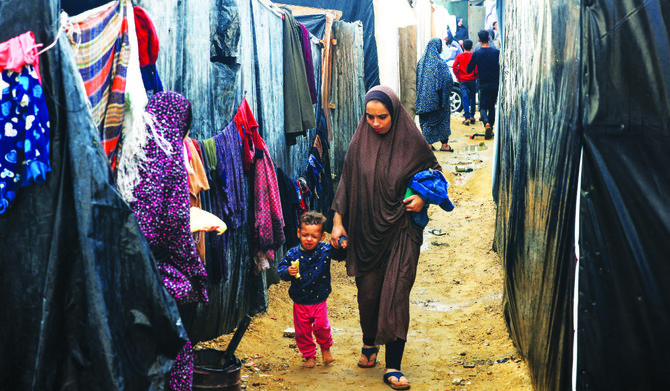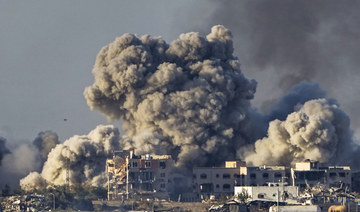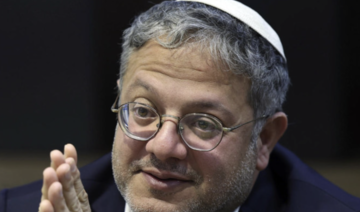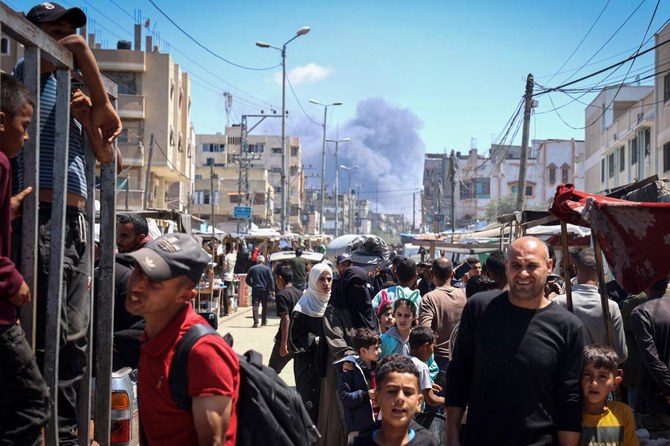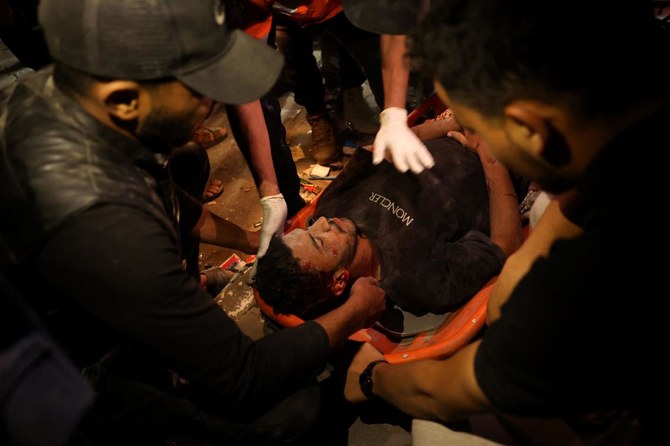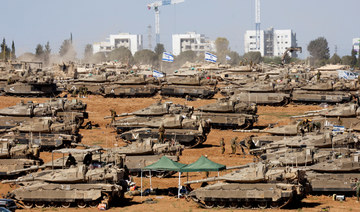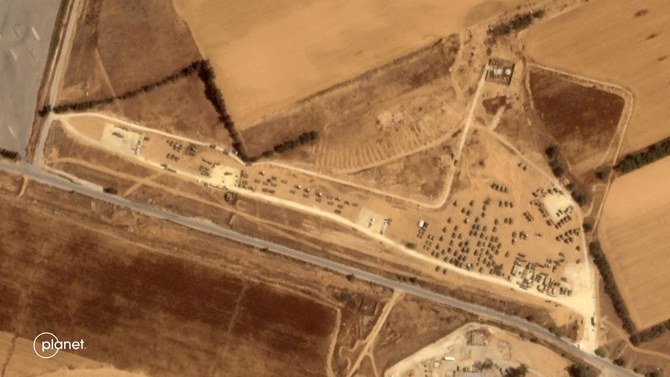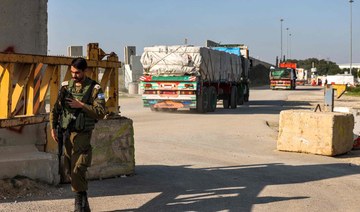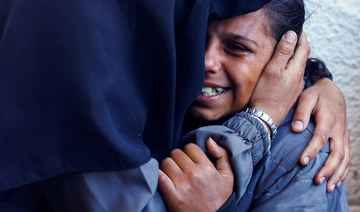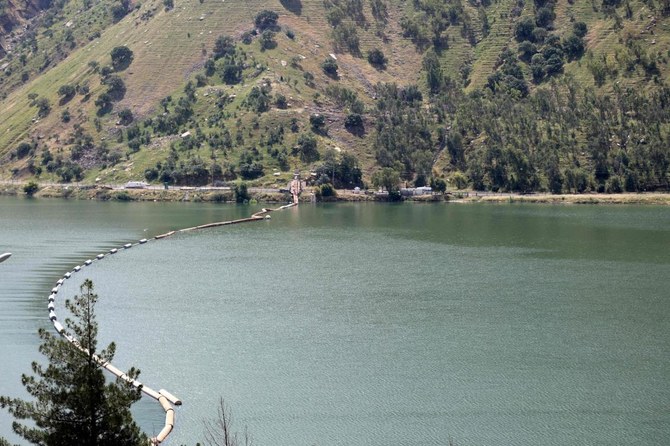DUBAI: In the Gaza Strip, civilians are being killed by more than Israeli bombs from the air or bullets flying between Israeli troops and Hamas militants battling at close range. They also face a slow death due to hunger and a lack of basic medical care as most hospitals in the enclave are out of service.
To the long list of potential killers, we can add one more: diseases. The World Health Organization has warned that the deadly concoction of war and health crisis due to a lack of food, clean water and shelter has become a “recipe for epidemics.”
From Nov. 29 to Dec. 10, cases of diarrhea in children under five jumped 66 percent to 59,895 cases and were up to 55 percent for the rest of the population in the same period, according to WHO data.

The pandemic exposed inequalities and divisions within and between nations. (AFP/Supplied)
The UN agency said the numbers were most certainly incomplete, and possibly higher, since all systems and services in Gaza had collapsed owing to the intensifying war between Israel and Hamas.
At the end of November, Dr. Mike Ryan, WHO executive director of health emergencies program, said at the UN headquarters that an ultimatum from Israeli forces to civilians to keep moving prompted a concentration of Palestinians in UNRWA centers and schools. This development, coupled with cold rain, caused a spike in child pneumonia, “fueling epidemic risks.”
INNUMBERS
21,000+
Palestinians killed in Gaza violence so far.
54,000+
People injured in the fighting since Oct. 7.
1,200
People killed in Hamas-led Oct. 7 attack in Israel.
240
Estimated people taken into Gaza as hostages.
168
Israeli troops killed since launch of ground offensive.
According to the WHO, very soon the public health risk will be “as grave as those faced with injuries that are going untreated with water, food and fuel so scarce.
“The perfect storm for disease has begun,” James Elder, chief spokesperson for the UN Children’s Fund, said in an interview on Dec. 12 with Reuters. “Now it’s about, ‘How bad will it get?’”

The World Health Organization has warned that the deadly concoction of war and health crisis due to a lack of food, clean water and shelter has become a “recipe for epidemics.”. (AFP/Supplied)
All kinds of infections are doing the rounds in the Middle East as cold weather sets in and illnesses menace residents of refugee camps from war-battered northern Syria to beleaguered Gaza, all areas with broken health infrastructure.
Epidemics are defined as high-impact infectious diseases. They differ from chronic, non-infectious diseases, such as heart disease and cancer, due to their sudden appearance and the usually short-lived nature of their duration.
FASTFACT
The UN observed International Day of Epidemic Preparedness on Dec. 27.
The other distinctive trait of epidemics is the magnitude and scale of their destruction such as that inflicted by the COVID-19 pandemic.
The pandemic exposed inequalities and divisions within and between nations, revealing the gaping holes in the world’s ability to prepare for, detect and react swiftly in the onslaught of an epidemic as well as other health emergencies.

No one in Gaza is safe from starvation, says Cindy McCain Executive director, World Food Programme
The Arab Human Development Report, published by the UNDP in September 2022, described how COVID-19 and climate change had set the Arab world back on its path to development.
The report came to conclusion that the pandemic “erased several years of gains in human development.”
Even before the pandemic struck, the Arab region was struggling with challenges that ran the gamut from conflict and food insecurity to political instability and high unemployment, which in turn produced lackluster economic growth year after year.

A deadly concoction of war and health crisis in Gaza due to lack of food, sanitation and shelter, raises the threat of outbreaks. (AFP)
The risk of epidemics and medical emergencies is strongest in Arab countries reeling from the effects of regional conflict, socioeconomic fragility and climate change. These include Jordan, Syria, Lebanon, Iraq, Egypt and Palestine.
One example was cholera outbreaks in Syria, Lebanon and Iraq during the second half of 2022. The old sickness, regarded as the 19th century’s most dreaded disease, reared its head in the fragile nations of the Levant just as they were recovering from the COVID-19 pandemic.
In December 2021, during a special session of the World Health Assembly, the WHO’s highest decision-making body, comprising all its 194 sovereign member countries, agreed on a “global process to draft and negotiate a convention, agreement or other international instrument under the constitution of the World Health Organization to bolster pandemic prevention, preparedness and response across the world.

Without aid, disease could spread to vulnerable Arab countries. (AFP/Supplied)
“The world was, and remains, unprepared for large-scale health emergencies,” Dr. Margaret Harris, a WHO spokesperson, told Arab News.
“The COVID-19 pandemic revealed deep flaws in the world’s defenses against health emergencies, exposed and exacerbated profound inequities within and between countries, and eroded trust in governments and institutions.”
Harris said that all countries need to be focused on three interlinked priorities as per the most recent draft of the pandemic agreement.
These are key “to the renewal and recovery of national and global health systems that we need to break the cycle of panic and neglect, improve population health, and make countries better prepared for and more resilient against future health emergencies.”
Countries are urged to “tackle the root causes of disease and ill-health, reorient health systems toward primary health care and universal health coverage and rapidly strengthen the global architecture for health emergency preparedness and response.”
The WHO divides the world into six regions. Most Middle Eastern countries fall into the Eastern Mediterranean region.
Harris said that the WHO looks at health crises from a global perspective rather than on a regional basis. Nevertheless, the organization’s plan for large-scale health emergencies can be applied to the Arab world.
Where health systems have deteriorated and a combination of social unrest and conflict is causing panic, trauma and violence to be a part of everyday life — as in the case of Gaza — addressing the WHO’s three priorities is a daunting challenge, if not altogether impossible.
Seventy-eight days into the Gaza war, more than 1.8 million people have been forced into densely populated shelter centers in limited geographic areas.
These shelters record high rates of infectious diseases like diarrhea, acute respiratory and skin infections, and hygiene-related diseases due to overcrowding, unhygienic conditions, and a lack of toilets and sanitation services.
Moreover, according to WHO figures from Dec. 10, 21 of the Gaza Strip’s 36 hospitals are now closed. Out of these, 11 are partially functional while four are working minimally.
“The entire health system here in Gaza just does not have the capacity to cope with the current situation,” Marie-Aure Perreaut, a Medecins Sans Frontieres emergency coordinator in Gaza, said in a statement.
“Hospitals are completely overwhelmed with the influx of wounded they’ve been receiving for the past few weeks.”
Perreaut noted that the MSF had to abandon a health center in Khan Younis 10 days ago because the area was within Israel’s evacuation orders. There, the charity had been treating diarrhea, skin infections and respiratory tract infections.
She told Reuters that two scenarios were now inevitable. “The first is that an epidemic of something like dysentery will spread across Gaza, if we continue at this pace of cases, and the other certainty is that neither the Ministry of Health nor the humanitarian organizations will be able to support the response to those epidemics,” she said.
As the Middle East’s cold temperatures and winter weather give rise to infections that in turn weaken immune systems, the risks of an epidemic in Gaza and its spillover even into Arab countries not mired in conflict will continue to be high.




